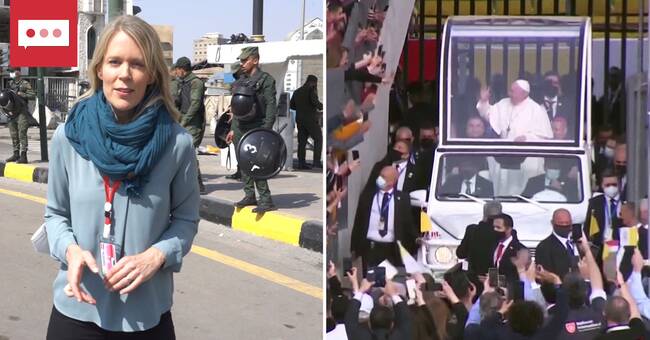Shiny newly paved streets are lined with newly planted flowers.
The pope's face meets us on posters and murals, and in the lampposts flags flutter in the Vatican's white-yellow colors.
Massive security operation
Baghdad is a militarized city even in ordinary cases, but now ten thousand extra soldiers have been called up.
We encounter bombing forces, counter-terrorism forces, plainclothes intelligence agents and almost no Baghdad residents.
The welcoming crowds who usually meet during pope visits have been urged to stay at home and follow the visit via TV.
Two popes before Francis have been allowed to cancel trips to Iraq, and many had thought that this trip would also be canceled after both Shia Muslim militias and the terrorist sect IS carried out attacks recently.
Now it feels like Iraq is holding its breath.
The security of the Christian minority
The pope - known as "Baba" in Arabic - has called the visit a "pilgrimage for peace" - and the safety of the Christian minority is a key word for the visit.
In a meeting with the Iraqi president, Pope Francis emphasized that "all Iraqis, regardless of faith, deserve the same rights and protection."
For Iraqi Christians hard hit by persecution, terror and trauma, every step he takes here in Iraq is loaded with symbolism.
Amid cheers and hallelujah shouts as the pope arrives at the Syrian Catholic Sayidat al Nejat church in Baghdad, I see several people crying.
This particular church was attacked by six terrorists with links to al-Qaeda on a Sunday night in 2010. 58 people were killed and 80 injured.
Iraq's Christian communities are among the oldest in the world, but they are a shrinking crowd.
More than one million Christians have left Iraq since the 2003 US-led invasion.
"It's like we get energy.
Baba comes with peace, ”says a young Christian man outside the church.
The papal mobile at home
Corona conditions have also worsened in Iraq and large parts of the country have been shut down.
The pope himself and his entourage have been vaccinated, but in Iraq the vaccination campaign has barely begun.
During the four days here in Iraq, the pope will travel over 1,400 kilometers.
The papal mobile has been left at home for security reasons, and some longer car journeys in armored convoy are also not relevant for fear of terrorist attacks.
Instead, much of the transport takes place by plane or helicopter.
Focus on dialogue
So often the news here from Iraq is about violent attacks.
Now the focus is on bridging divisions.
Baghdad residents, who belong to the Shia Muslim majority, also tell us that they hope the pope's visit means something positive for Iraq.
In a cold room in an unassuming apartment in the city of Najaf, 350 km south of Baghdad, Pope Francis met another of the world's most influential religious leaders, the Grand Ayatollah Ali al-Sistani.
Al-Sistani, who rarely speaks out about politics, has a major impact on the country's Shia Muslim militias.
After the meeting, al-Sistani said that Iraqi Christians should live in peace and security with full civil rights, like all Iraqis.
That this will be the case is far from certain.
But the meeting itself sends a message of dialogue.

